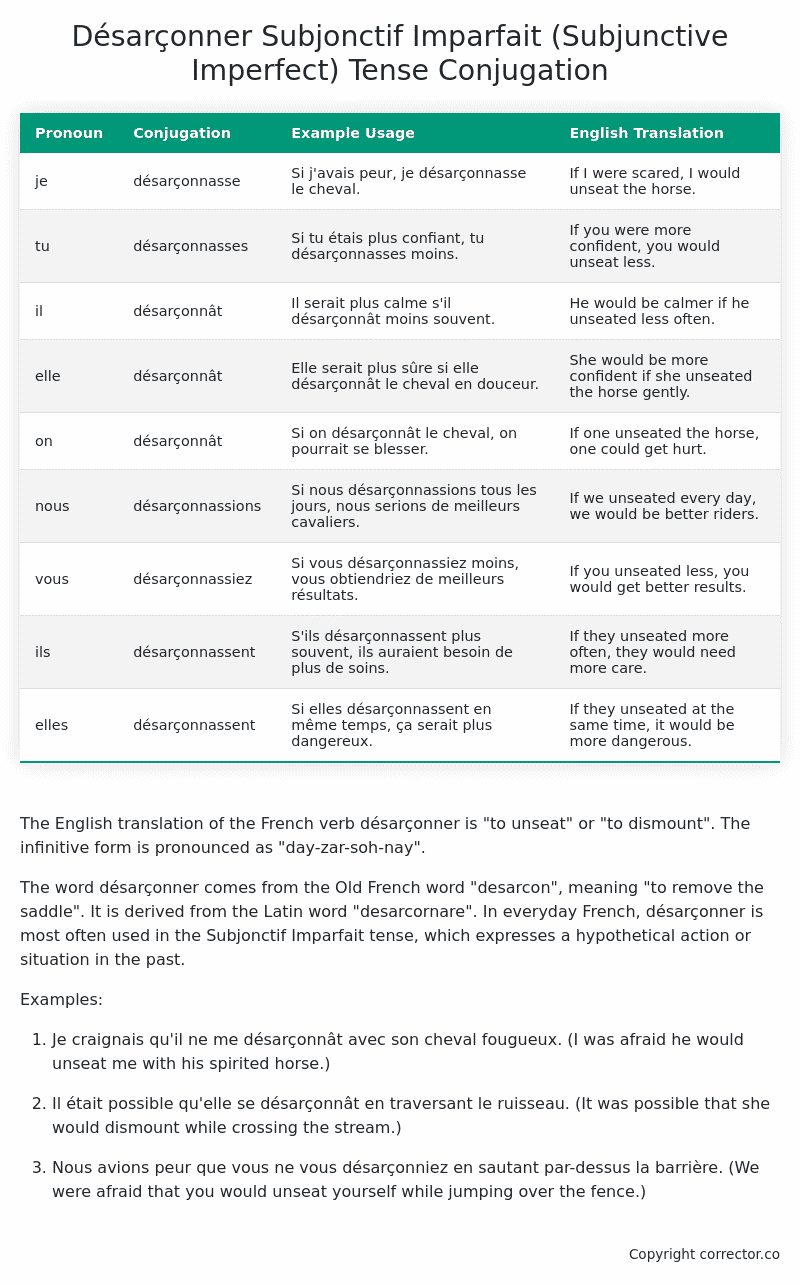Subjonctif Imparfait (Subjunctive Imperfect) Tense Conjugation of the French Verb désarçonner
Introduction to the verb désarçonner
The English translation of the French verb désarçonner is “to unseat” or “to dismount”. The infinitive form is pronounced as “day-zar-soh-nay”.
The word désarçonner comes from the Old French word “desarcon”, meaning “to remove the saddle”. It is derived from the Latin word “desarcornare”. In everyday French, désarçonner is most often used in the Subjonctif Imparfait tense, which expresses a hypothetical action or situation in the past.
Examples:
-
Je craignais qu’il ne me désarçonnât avec son cheval fougueux. (I was afraid he would unseat me with his spirited horse.)
-
Il était possible qu’elle se désarçonnât en traversant le ruisseau. (It was possible that she would dismount while crossing the stream.)
-
Nous avions peur que vous ne vous désarçonniez en sautant par-dessus la barrière. (We were afraid that you would unseat yourself while jumping over the fence.)
Table of the Subjonctif Imparfait (Subjunctive Imperfect) Tense Conjugation of désarçonner
| Pronoun | Conjugation | Example Usage | English Translation |
|---|---|---|---|
| je | désarçonnasse | Si j’avais peur, je désarçonnasse le cheval. | If I were scared, I would unseat the horse. |
| tu | désarçonnasses | Si tu étais plus confiant, tu désarçonnasses moins. | If you were more confident, you would unseat less. |
| il | désarçonnât | Il serait plus calme s’il désarçonnât moins souvent. | He would be calmer if he unseated less often. |
| elle | désarçonnât | Elle serait plus sûre si elle désarçonnât le cheval en douceur. | She would be more confident if she unseated the horse gently. |
| on | désarçonnât | Si on désarçonnât le cheval, on pourrait se blesser. | If one unseated the horse, one could get hurt. |
| nous | désarçonnassions | Si nous désarçonnassions tous les jours, nous serions de meilleurs cavaliers. | If we unseated every day, we would be better riders. |
| vous | désarçonnassiez | Si vous désarçonnassiez moins, vous obtiendriez de meilleurs résultats. | If you unseated less, you would get better results. |
| ils | désarçonnassent | S’ils désarçonnassent plus souvent, ils auraient besoin de plus de soins. | If they unseated more often, they would need more care. |
| elles | désarçonnassent | Si elles désarçonnassent en même temps, ça serait plus dangereux. | If they unseated at the same time, it would be more dangerous. |
Other Conjugations for Désarçonner.
Le Present (Present Tense) Conjugation of the French Verb désarçonner
Imparfait (Imperfect) Tense Conjugation of the French Verb désarçonner
Passé Simple (Simple Past) Tense Conjugation of the French Verb désarçonner
Passé Composé (Present Perfect) Tense Conjugation of the French Verb désarçonner
Futur Simple (Simple Future) Tense Conjugation of the French Verb désarçonner
Futur Proche (Near Future) Tense Conjugation of the French Verb désarçonner
Plus-que-parfait (Pluperfect) Tense Conjugation of the French Verb désarçonner
Passé Antérieur (Past Anterior) Tense Conjugation of the French Verb désarçonner
Futur Antérieur (Future Anterior) Tense Conjugation of the French Verb désarçonner
Subjonctif Présent (Subjunctive Present) Tense Conjugation of the French Verb désarçonner
Subjonctif Passé (Subjunctive Past) Tense Conjugation of the French Verb désarçonner
Subjonctif Imparfait (Subjunctive Imperfect) Tense Conjugation of the French Verb désarçonner (this article)
Conditionnel Présent (Conditional Present) Tense Conjugation of the French Verb désarçonner
Conditionnel Passé (Conditional Past) Tense Conjugation of the French Verb désarçonner
L’impératif Présent (Imperative Present) Tense Conjugation of the French Verb désarçonner
L’infinitif Présent (Infinitive Present) Tense Conjugation of the French Verb désarçonner
Struggling with French verbs or the language in general? Why not use our free French Grammar Checker – no registration required!
Get a FREE Download Study Sheet of this Conjugation 🔥
Simply right click the image below, click “save image” and get your free reference for the désarçonner Subjonctif Imparfait tense conjugation!

Désarçonner – About the French Subjonctif Imparfait (Subjunctive Imperfect) Tense
Formation
Common Everyday Usage Patterns
Interactions with Other Tenses
Subjonctif Présent
Indicatif Passé Composé
Conditional
Conditional Perfect
Summary
I hope you enjoyed this article on the verb désarçonner. Still in a learning mood? Check out another TOTALLY random French verb conjugation!


